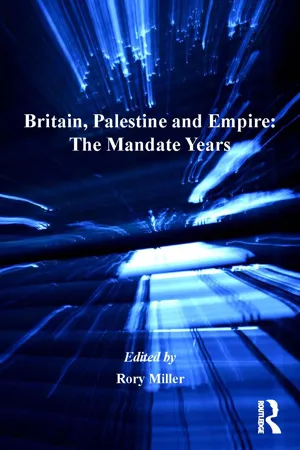
- 208 pages
- English
- ePUB (mobile friendly)
- Available on iOS & Android
Britain, Palestine and Empire: The Mandate Years
About This Book
In 1948, Britain withdrew from Palestine, bringing to an end its 30 years of rule in the territory. What followed has been well-documented and is perhaps one of the most intractable problems of the post-imperial age. However, the long-standing connection between Britain and Palestine before May 1948 is also a fascinating story. This volume takes a fresh look at the years of the British mandate for Palestine; its politics, economics, and culture. Contributors address themes such as religion, mandatory administration, economic development, policy and counter-insurgency, violence, art and culture, and decolonization. This book will be valuable to scholars of the British mandate, but also more broadly to those interested in imperial history and the history of the West's involvement in the Middle East.
Frequently asked questions
Chapter 1Flawed Foundations: The Balfour Declaration and the Palestine Mandate*
Table of contents
- Cover Page
- Half Title Page
- Title Page
- Copyright Page
- Table of Contents
- Acknowledgements
- Abbreviations
- About the Contributors
- Introduction: Britain, Palestine and Empire: The Mandate Years
- 1 Flawed Foundations: The Balfour Declaration and the Palestine Mandate
- 2 The Impact of League Oversight on British Policy in Palestine
- 3 ‘Our Jerusalem’: Bertha Spafford Vester and Christianity in Palestine during the British Mandate
- 4 Views of Palestine in British Art in Wartime and Peacetime, 1914–1948
- 5 No Holy Statistics for the Holy Land: The Fallacy of Growth in the Palestinian Rural Economy, 1920s–1930s
- 6 The Peel Commission and Partition, 1936–1938
- 7 Lawlessness was the Law: British Armed Forces, the Legal System and the Repression of the Arab Revolt in Palestine, 1936–1939
- 8 ‘An Oriental Ireland’: Thinking about Palestine in Terms of the Irish Question during the Mandatory Era
- 9 Palestine, 1945–1948: a View from the High Commissioner’s Office
- Index